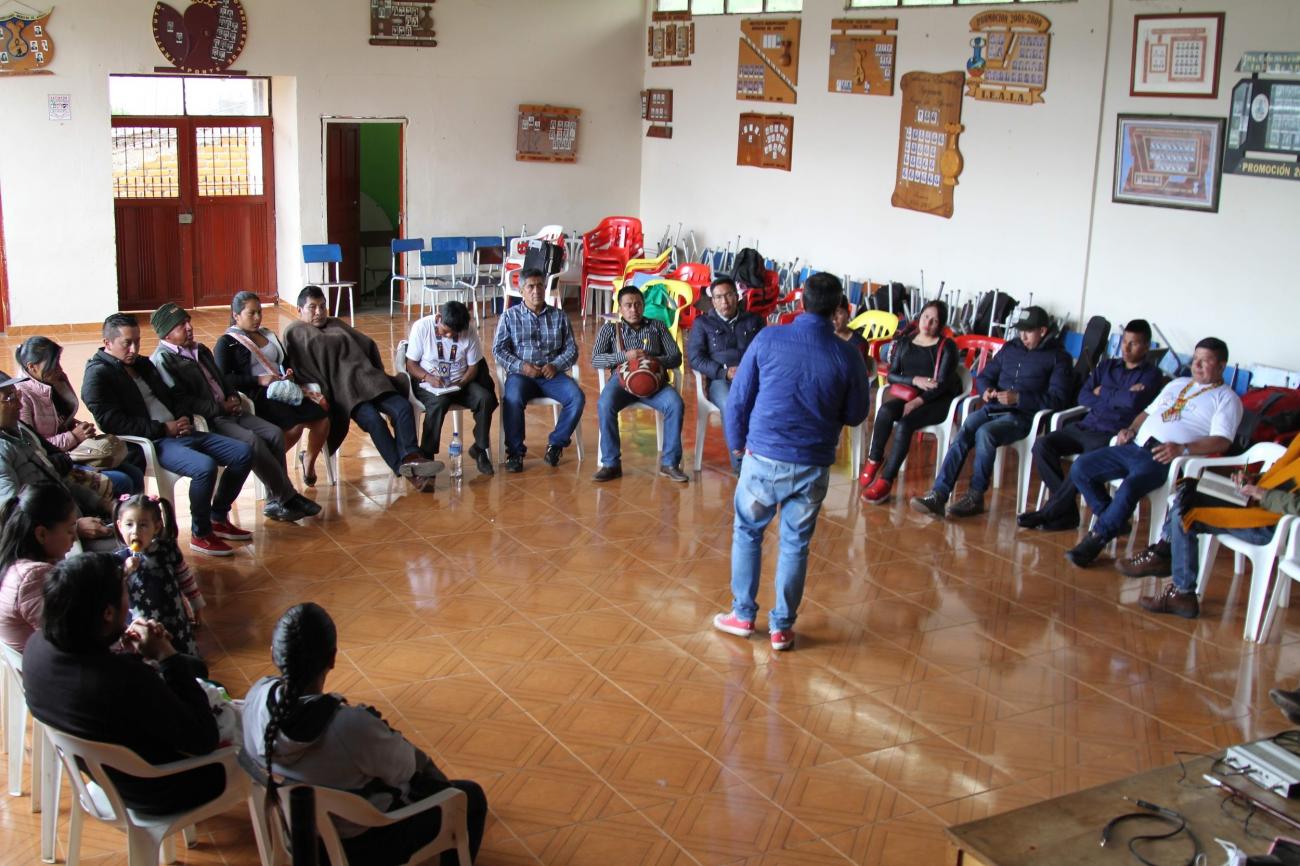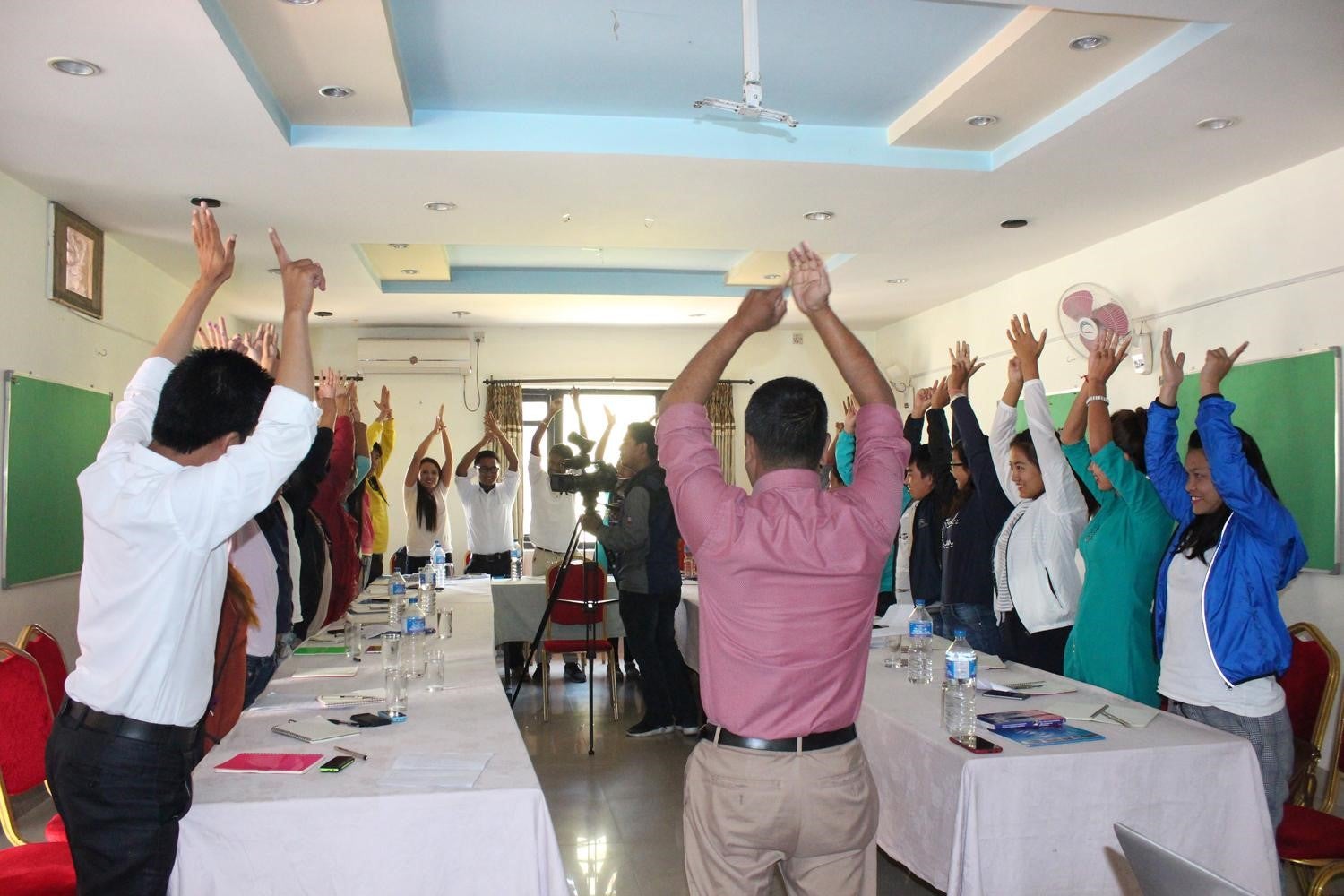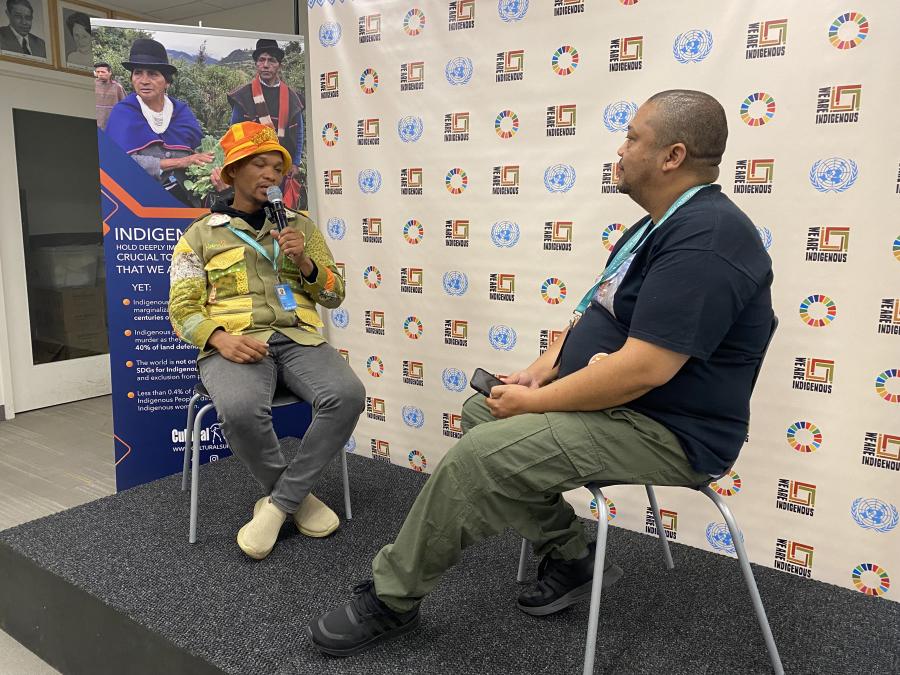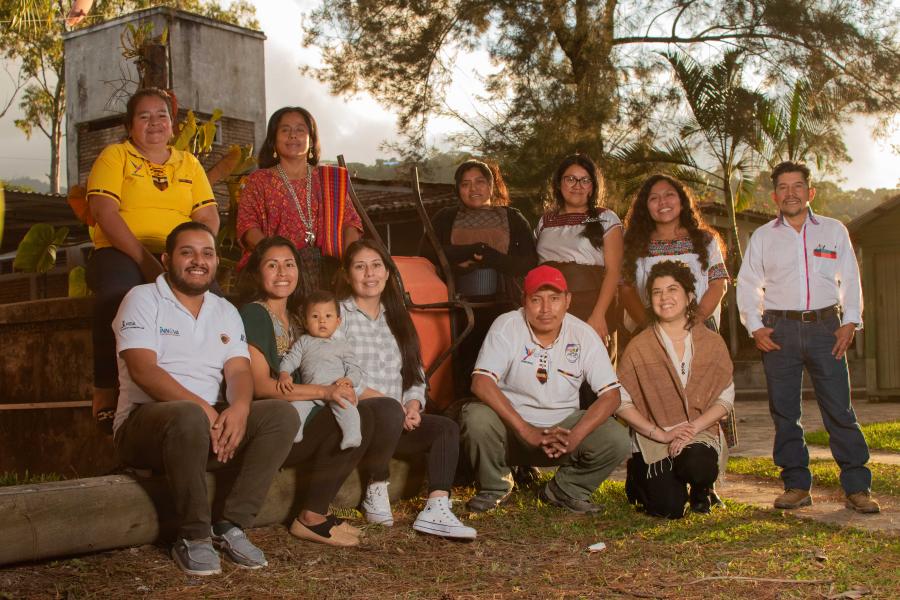
Photo: Red Intercultural de Medios de Comunicación de los Pueblos Indígenas (RIMCOPI).
En español
Cultural Survival’s Community Media Program is pleased to announce eight multi-radio grant partners. The purpose of this initiative is to support regional Indigenous community radio stations and Indigenous organizations in strengthening capacities within stations and promote the voices of Indigenous Peoples as well as strengthen alliances to work in collectives to respond to the needs of the Peoples that the stations serve. The following projects received a total of $88,743 in the first half of 2020 benefiting 73 Indigenous radio stations and 13 organizations related to communication and self government. Most of these projects are co-funded with our communications partner WACC.
Asociación de Cabildos Indígenas del Norte del Cauca -ACIN, (Nasa Nation), Santander de Quilichao, Cauca, Colombia
The Association of Indigenous Councils of the North of Cauca was established by the Nasa people in 1994. It has the backing of the Territorial Council of Ancestral Authorities of the CXHAB WALA KIWE-ACIN and 21 associated authorities. ACIN was born in response to the uncertainty and danger associated with drug trafficking and other sources of violence that are experienced in the territory. ACIN’s project encourages the participation of the Network of Community Radio Stations as well as 70 community journalists and media creators from the Intercultural Indigenous University (UAIIN) and the Regional Indigenous Council of Cauca (CRIC) to consolidate communication work online in the north of Cauca. They will organize trainings and produce content in various formats about land defense and establish alliances with other organizations. The radio stations participating in this project are: Nasa Estéreo 99.4 FM, Voces de Nuestra Tierra 107.4 FM, Proyecto Global de Jámbalo, Association of Afro-descendant Women of Northern Cauca (ASOM), the Wej'xia Kaa'senxi communication network, and Radio Pa ' yumat of the ACIN Communications Fabric.
Indigenous Peoples Intercultural Community Media Network - RIMCOPI and Foundation for Economic and Social Development in Nariño - PROCOINDES (Awa, Cofán Eperara, Siapidaara, Inga, Pastos, Quillasingas Peoples), Nariño, Colombia
The Network organizes trainings for Indigenous journalists and broadcasters. The Network will work on a second training phase aimed at El Buen Vivir-- a collective and individual way of life in harmony with mother earth and the cosmos. The project will promote revitalization of Indigenous Peoples of Nariño worldviews and their rights through training in production and technology. The radio programs will be distributed in schools, to radios stations, and to Indigenous councils.
The community radio stations that make up the multi-radio project are: Inga Estéreo (Inga De Aponte), Camawari Estéreo (Awa Ricaurte David Urbano), La Voz De Los Pastos (Pasto de Pastas Aldana), Alcalá Radio (Pasto de Muellemues), Identidad Stereo ( Pasto de Pananhermes), Laguna Stereo (Pasto de Pananhermes), Sureña Radio (Pasto de San Juan Aníbal), Colimba Stereo (Pasto de Colimba), Máxima FM (Pasto de Sapuyes), Tropicalisima (Pasto de Guaitarilla), Calientsima Estéreo (Awa del Diviso), Radio Quillasinga (Quillasinga del Encano), Cheverisima Stereo (Pasto de Aldea De María), La Voz De La Frontera (Pasto de Ipiales), Super Fantastica (Pasto de Ospina), Pueblo Cofan (Cofan de Santa Rosa), Eperara people (Eperara Siapidaara). Ninety-eight Indigenous journalists and media creators will benefit from this project.
CONFENAIE Voice, Kimsakocha Radio, Radio Kipa & Radio Jatari Kichwa, (Achuar, Andwa, Cofan, Kichwa, Kijus, Sapara, Saraguro, Siona, Siekopai, Shiwiar, Shuar, and Waorani Indigenous Nations), Amazon and Highlands in Ecuador
Community organizations and Indigenous media are fighting in defense of their lands and territories through community media due to the advance of extractivist policies and the concession of Indigenous territories to transnational companies. Radio Kimsacocha, Kipa Radio, the Voice of CONFENIAE, Radio Jatari Kichwa are allies in the production and dissemination of radio programs that promote land defense from a rights-based and gender equality perspective. Their project strengthens the production and dissemination of radio content that promotes the rights of Indigenous communities, demanding the cessation of criminalization against leaders. The project also strengthens political participation, especially the role of Indigenous women in protecting Indigenous territories. It also strives to support alliance building and community communication networks at the national level, promoting community communication as a fundamental right of Indigenous Peoples in a plurinational and pluriethinic State. Thirty community journalists will benefit directly from this project.

Indigenous Community Radio Network-ICRN , (Nepali Indigenous Peoples), Kathmandu, Nepal
Indigenous Community Radio Network is an umbrella organization of 21 Indigenous community radio stations in Nepal. Founded in 2017, the organization is helping to share skills and knowledge to strengthen the capacity of Indigenous community radios to promote Free, Prior and Informed Consent, human rights, land rights, Indigenous self-determination, and access to information. The Network's project will enhance technical capacity of community journalists and media creators to lobby and advocate for human rights, communication law and policy change at regional and national government levels. Thirty grassroots journalists with a strong participation of women, will receive training in Indigenous rights and corporate accountability. In addition, a national consultation to improve communication laws at regional and national levels will be led by the stations and other allied communication organizations.
Mesoamerican Network of Indigenous, Garifuna and Feminist Community Radios (Q'eqchi', Quiché, Ixil, Mam and Poqomchí, Garifuna and Lenca), Guatemala and Honduras
The Mesoamerican Network works with the Civic Council of Popular and Indigenous Organizations of Honduras (COPINH) in Honduras, and the Organization of Workers for Resistance and Autonomy (La Otra Cooperativa) and with Communicators and Popular Communicators for Autonomy (COMPPA) in Guatemala. The Network’s objective is to organize, educate, train and support Indigenous media creators in exercising their rights and work to create spaces that promote freedom of expression in places where many community leaders are targets of persecution for their work. The Network’s project focuses on the creation of a network of community correspondents, the installation and equipping of local media centers, the improvement of the Mesoamerican Network website, and an international communications forum. This project will benefit 69 media creators from 17 radio stations belonging to 9 organizations, in addition to 20 communicators from partner organizations.
Mesa de Radios Indígenas de la Asociación de Medios de Comunicación Honduras -AMCH, (Lenca, Tolupan and Garífuna Peoples), Honduras
The Honduras Media Association through Mesa Indigena brings together 12 Indigenous radio stations and established the need for the use of technology for the defense of Indigenous rights as well as the need to strengthen communication skills in order to disseminate information about unjustified persecutions against Indigenous leaders. The collaboration of COFADEH (Committee of Relatives of Disappeared Detainees in Honduras) and CIPRODEH (Center for Research and Promotion of Human Rights) is part of this training project for six beneficiary radio stations which aims to strengthen the use of technology and communication tools ) by Indigenous media creators and community journalists. The six beneficiary radio stations are: Radio Odeco, Radio Tepemechin, Victoria Yoro, Radio Morazanista, Radio Zavalanquira Yamaranquila , Radio Intibuca, Radio Lepaterique by Francisco Morazán and Radio Revelación by Francisco Morazán. Twelve media creators will benefit from this project.
Radio Yapti Tasba Bila Baikra, Radio Wangki Yapti Tasba Bila Baikra, (Miskitu, Mayagna, Ulwa, Tuahka and Afro-descendant Peoples), Carribbean Coast, Nicaragua
Radio Yapti Tasba Bila Baikra, Radio Yapti Tasba Bila Baikra San Carlos and Radio Wangki Yapti Tasba Bila Baikra are collaborating on the production of 12 radio programs in Indigenous languages, mainly Miskitu, about land healing and clean up, collective rights, the state of Indigenous sovereignty in Nicaragua, implementation of the Yatama vs. Nicaragua judgment on Indigenous rights, gender equality, equity, and the inclusion of women. The three stations reach Miskitu, Mayagna, Ulwa, Tuahka Indigenous Peoples and the Afro-descendant population in Indigenous territories such as: Awaltara, Amasau, Aubra, Li Lamni, Li Aubra, Miskitu Indian Tasbaika, Prinzu Awala, Prinzu Auhya Un, Karata, Kipla, Kipla Sait, Tasba Pri, Tasbaika Kum, Tawira, Twi Yahbra, Twi Waupasa, Tuahka, Wanhki Maya, Wanhki Twi, with a coverage of approximately 154 communities of which 95% are Miskitu located in the South Caribbean Coast.
Bi-National Project of the Great Awá Family, (Awá Nation), Ecuador and Colombia
The creation of the Great Binational Awá Family is preceded by the internal armed conflict in Colombia, the incursion of megaprojects, monoculture, drug trafficking and the historical abandonment of Indigenous Peoples by Ecuadorian and Colombian States. In Colombia, the Awá live in Nariño and Putumayo and in Ecuador they are in the northern part in Carchi, Imbabura and Esmeraldas. Local Indigenous radio stations will train the Awá population in audiovisual and radio production to contribute to the strengthening of cultural identity and the defense of the rights of mother earth. They will train 20 young people through audiovisual workshops. In addition, the Network of Communicators and Stations of the Awa People will be formed, made up of four stations, three in Colombia and one in Ecuador. Radios benefitted by this project are Radio Ampara Su, Radio la Voz de los Awá, Radio Ñambi Telembi Stereo, and Radio Camawari Stereo.


